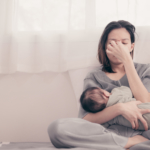About 15% of women will experience postpartum depression after the birth of a child. While most of those women will have unipolar depression, a certain number of women will have bipolar depression. At this juncture, making the correct diagnosis is vital, as the treatment of bipolar depression differs from the treatments typically used for unipolar depression is this setting. Furthermore, the use of antidepressants in a woman with bipolar disorder may not be effective and may actually make the symptoms worse.
The first step in making this distinction rests upon a careful review of past psychiatric symptoms. Is there a history of mania or hypomania? But for many women with bipolar disorder, depressive episodes predominate. It is thus fairly common that the first episode, and possibly subsequent episodes, are depressive in nature and occur prior to the onset of a hypomanic or manic episode.
In women who present with postpartum depression, is it possible to distinguish unipolar depression for bipolar disorder when the first onset of illness is a depressive episode? Using a multicenter cohort of patients with bipolar disorder, researchers attempted to identify clinical and demographic features which distinguish bipolar from unipolar depression.
Using data from the FACE-BD (FondaMental Academic Centers of Expertise for Bipolar Disorders), a French multicenter cohort of patients with bipolar disorder, researchers identified all women who had onset of bipolar disorder with a major depressive episode and who had at least one child. They compared two groups of women, depending whether the onset of bipolar illness occurred during or outside of the postpartum period.
Among the 759 women in this cohort, 93 (12.2%) experienced a postpartum onset of illness, and 666 (87.8%) experienced onset outside of the postpartum period. Women who had postpartum onset of bipolar disorder had a more stable family life, more children, and were older at age at illness onset. They were more likely to have Bipolar Disorder Type 2, less likelty to hav e history of suicide attempts, and had fewer depressive episodes.
While this is one of the few studies looking at the features which may help clinicians to distinguish unipolar from bipolar postpartum depression, the information is of limited clinical utility. It may provide some reassurance in that the onset of bipolar disorder (with depression) during the postpartum period is less common than non-postpartum onset. Furthermore, it appears that women who present with bipolar depression during the postpartum period have less severe illness (fewer depressive episodes, fewer suicide attempts, lower risk for mania) and have higher levels of family support.
Nonetheless, vigilance is required in screening women who present with postpartum depression for bipolar disorder. While previous studies have shown that women with elevated scores on the Edinburgh Postnatal Depression Scale (EPDS) may actually have bipolar disorder, other tools like the Mood Disorders Questionnaire (MDQ) may help clinicians to identify women with bipolar disorder.
Ruta Nonacs, MD PhD
Reference:
Tebeka S, Godin O, Mazer N, Bellivier F, Courtet P, Etain B, Gard S, Leboyer M, Llorca PM, Loftus J, Olié E, Passerieux C, Polosan M, Schwan R, Belzeaux R, Dubertret C; FondaMental Advanced Centers of Expertise in Bipolar Disorders (FACE-BD) Collaborators. Clinical characteristics of bipolar disorders with postpartum depressive onset. Prog Neuropsychopharmacol Biol Psychiatry. 2020 Dec 18.
Related Posts:
Using the EPDS During Pregnancy: What Exactly are We Screening For?
What Screening Tools Identify Postpartum Women with Bipolar Disorder?
Screening for Depression During Pregnancy May Lead to Misdiagnosis for Women with Bipolar Disorder








Leave A Comment